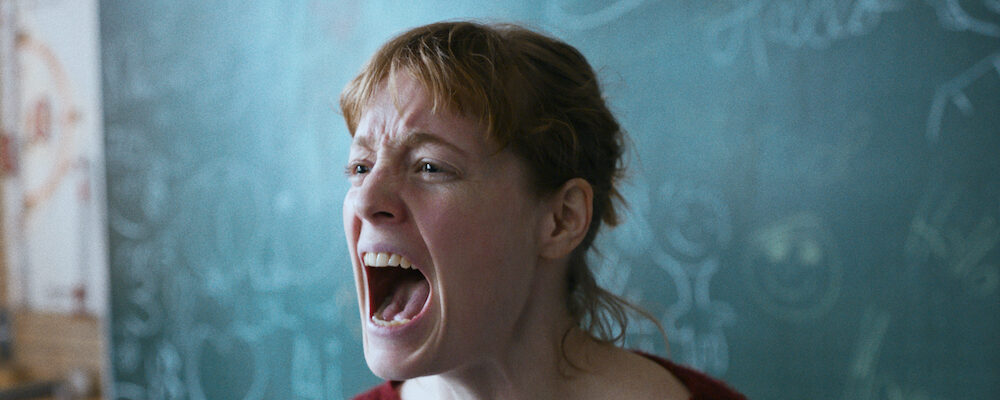Ilker Çatak’s ‘The Teachers’ Lounge’ Puts a Compelling Twist on Class Warfare
Tony Sokol
Early in German director Ilker Çatak’s educational drama “The Teachers’ Lounge,” seventh graders debate whether 0.999… equals one, and are called to the chalkboard to defend their conclusions. Most students speculate on the undefinable difference. Oscar (Leo Stettnisch), a more astute student, proves they are the same using a mathematical formula. Leonie Benesch plays their math and gym instructor, Carla Nowak, which means newcomer in German. She unwittingly sets the tone by pitting the young theorists against each other. Tangibles and facts both lie between the decimals, fine print hides truths, and everyone takes sides.
This German Oscar entry centers on the growing mistrust which comes from an internal investigation into a series of minor thefts at a German middle school. Kids are forced to rat out other kids, essentially, and the suspects are as suspicious as the faculty, who merely “incite the students to denounce others,” is suspect. As a social parable, this conflict escalates in its most glorious form as the student newspaper. The young editors on staff point out how truth is its own reward, and everything else is public relations. Sales may be banned, but word-of-mouth is unenforceable.
The school is a microcosm, perfectly representing a larger world of prejudices, double standards, and bureaucratic fear which needs to be taught a lesson. The paranoia of invasive technology cuts into the classrooms and lounges, and comes from the outside as a commonplace WhatsApp group chat where the parents have their own concept of “zero tolerance” policies.
After witnessing one staffer take money from the community coffee fund mug in the teachers’ lounge, Carla plays amateur detective. She leaves her wallet at a table, and records the room on her laptop while she teaches gym. The video entrapment implicates the school’s office administrator, Mrs. Kuhn (Eva Löbau), in the small theft. After giving Kuhn the chance to own up to the petty crime, the new teacher shows the video to the principal, Bettina Böhm (Anne-Kathrin Gummich), and the ordered world begins to fall apart. Kuhn’s son happens to be Oscar, who turns Carla’s reputation inside out like the Rubik’s cube she loans him. He is a middle school hero. Carla is not truly the villain, but everyone is a scapegoat. It’s built into the curriculum.
“The Teacher’s Lounge” works as a campus crime metaphor and a coming-of-age film, as well as a story of loss of innocence, but the pupils are the ones with their eyes open. Their idealistic teacher stumbles blindly through her first semester, knocking over everything in her path, and baring the unpleasant realities just beneath the surface. The film opens on an interrogation, claimed to be voluntary, where students Lukas (Oscar Zickur) and Jenny (Antonia Küpper) finger a Turkish classmate, Ali (Can Rodenbostel), as someone who might be behind the rash of thefts. The subsequent scene where Ali is socially isolated and searched feels downright sinister, even as it is an attempt to avoid the appearance of covert racism. Only Carla believes Ali and his parents at face value.
Carla gets the same treatment from the staff, as the only difference between what happens in the classroom and the faculty retreat is: “what happens in the teachers’ lounge stays in the teachers’ lounge.” At least that’s what the new teacher believes, until she gets schooled while trying to be clever, and is caught in the headlights of a twisting reality. Shot in an almost documentary-level cinema verité style, cinematographer Judith Kaufman deadens the colors to match Carla’s struggling optimism. The school’s hallways and facilities become increasingly institutionalized under the harsh lights. The last touch of warm greenery is stubbed out with the cigarettes some students sneak during gym. A short surreal aside is redundant as an explainer, and unnecessary. The floating camera shadowing Carla brings the urgency and unrelenting scrutiny which the score translates to ominous, growing foreboding.
Benesch deftly unravels during the film, her naiveté gives way to anxiety, but never becomes cynical. Carla teaches “a proof needs a derivation that builds up step by step,” but her ad hoc judicial experiment is seen as a violation of personal rights by all sides. The student journalists’ ambush is excruciatingly entertaining. The students see themselves fighting the good fight, while Carla means well, but fumbles every execution. The faculty only sees dangerous nonconformity, and everyone looks for traitors.
The acting is consistently exceptional, and the younger cast give perfectly naturalistic performances. They are all A students, mastering verbal nuances, and killing it with non-verbal rejoinders. Padmé Hamdemir and Lisa Marie Trense capture the cautious rebellion of 12-year-olds caught in the act of skipping class; Jonas Albrecht effortlessly expresses the desperate defiance of a student in an academic deadlock. Stettnisch’s Oscar is a disciplined study in how conscious chaos can bring order.
“The Teachers’ Lounge” does not present an easy ending. There are no winners, except the one character who most visibly loses. The closing presents a triumph masterfully obscured by the illusion of futility, and the excitement of the exit strategy is undeniable. Even the most well-worked calculations don’t add up. Everyone always comes up short. Crimes of censorship and trial by media feed into each other, and class consciousness is not contained in schools. “The Teachers’ Lounge” is riveting, unpredictable, and completely believable. It is a very welcome addition to curriculum cinema.
“The Teacher’s Lounge” releases Dec. 25 in select theaters.

